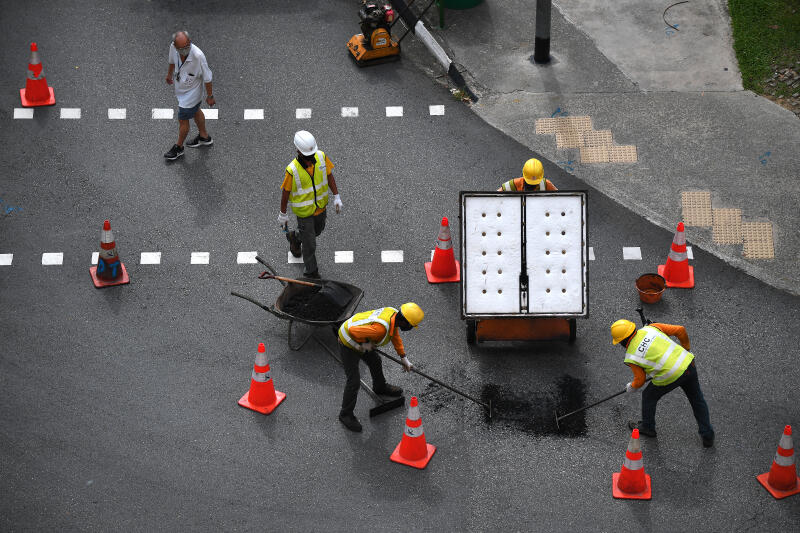Coronavirus: Migrant workers important to S'pore economy, say business and trade groups in response to calls to limit numbers
Sign up now: Get ST's newsletters delivered to your inbox

The groups urged careful consideration of stricter policies, highlighting the value of foreign labour in different areas.
ST PHOTO: KUA CHEE SIONG
Follow topic:
SINGAPORE - In coordinated statements on Wednesday (May 27), business groups and trade associations underlined the importance of migrant workers to Singapore's economy, in response to calls to restrict their numbers after the Covid-19 outbreak among this population.
The groups urged careful consideration of such stricter policies, highlighting the value of foreign labour in different areas, such as in the manufacturing, marine, process, and construction industries, given the country's manpower limitations.
Attention has been drawn to the living conditions of Singapore's migrant workers since the Covid-19 outbreak in dormitories grew last month. They now form more than 90 per cent of Singapore's confirmed cases, which stood at 32,876 as of Wednesday (May 27).
In a joint statement, the Singapore Indian, Malay and Chinese Chambers of Commerce and Industry noted how there have been calls for stricter migrant worker policies, including having fewer workers.
They said the contributions of migrant workers were immense and have been acknowledged by the country.
"They have enabled Singapore to continue developing as a good home and a good place to do business. Given Singapore's limited workforce, we would not be able to stay competitive in certain sectors otherwise if not for migrant workers."
They said migrant workers take on many lower-end jobs in Singapore. "This allows the vast majority of Singaporeans to take on PMET jobs, and help in creating an innovation-based economy as well. Thus, we urge the Government and Singaporeans to carefully consider the next steps on migrant workers," they added, referring to jobs for professionals, managers, executives and technicians.
Calling migrant workers the backbone of Singapore's construction, marine shipyard, and process sectors, chairman of the Singapore Indian Chamber of Commerce and Industry T. Chandroo said it was crucial to take care of them, especially at a difficult and stressful time like during this period.
As of March this year, there were 720,800 work permit holders in Singapore, excluding foreign domestic workers. Of that number, 287,800 of them were in the construction industry.
There were 194,900 S-pass holders, and 193,800 on employment passes.
MANUFACTURING, MARINE, AND PROCESS
In another joint statement, the Singapore Manufacturing Federation, Association of Singapore Process Industries, and the Association of Singapore Marine Industries said they were encouraged by how Singapore employers generally have a good reputation among migrant workers here.
It said a majority of these workers voluntarily stay in Singapore after completing their initial contracts, with many staying for more than 10 years. They also encourage their family members and friends to work in Singapore.
"These two facts are perhaps the strongest among others to refute reports or claims that living conditions in Singapore for migrant workers are dire."
It noted that Singapore was an ageing society, with no hinterland to draw additional workers from, unlike other countries. The unemployment rate is low, and employers face challenges in attracting Singaporeans, it added.
The manufacturing sector accounts for about 20 per cent of Singapore's GDP, with a large number of those involved in the manufacturing process, from movement of material, stock-taking, and logistics fulfilment, being supported by migrant workers.
"To keep up with the production capacity as a key contributor to the nation's GDP, manufacturers are grateful for the access to the pool of foreign labour," said the statement, adding that a recent survey of manufacturers showed that more than 75 per cent of respondents thought retaining their foreign workforce was important.
CONSTRUCTION INDUSTRY
On calls to reduce the migrant worker population, president of the Specialists Trade Alliance of Singapore Thomas Ang said one important question was whether Singaporeans can accept higher costs and inconveniences if many rank-and-file jobs to keep its industry running cannot be filled easily by locals.
He gave the example of how the maintenance of lifts and escalators will be further strained if there were fewer migrant workers.
The association represents specialist contractors and suppliers in the building and construction industry, with more than 1,300 firms as members.
The Singapore Contractors Association's president Ng Yek Meng said Singapore was not yet in a position to do away easily with foreign manpower.
"We will work closely with all industry stakeholders to transform the construction industry to build more with less labour. But this will take time," he said, adding that the number of foreign workers can be reduced when the number of construction projects decreases.
A cut in the number of foreign labour would lead to higher construction costs, he said. It would also be more difficult for companies to compete for strategic projects, such as building new manufacturing facilities, energy plants and tourist attractions.
The association represents the construction industry, with about 3,000 members.
Higher construction costs will also have a trickle-down effect and cause housing prices, including those of Housing Board flats, to rise, he said in a statement. They would also take longer to build.
"We hope that the conditions of the construction industry will be viewed with fairness and without prejudice, taking into account the full context of Singapore's landscape, economy and population demographic. We urge our Government to consider its next steps on foreign worker issues cautiously."

